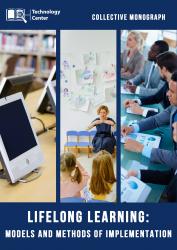Managing the professional development of academic staff in Ukrainian universities under the conditions of expanding institutional autonomy
Keywords:
maturity, organizational competence, pedagogical experiment, methods, criterion, criterionlevels, correlation, statistics, lists in physical culture and sports, adult education, concept of continuous adult education, new paradigm of, adult education development trends, megatrends in adult education, soft, niversal (ability)/theoretical (knowledge) models of education, development mechanism, regional (meso)/global (planetary) levels, interstate cooperation in fields of adult education, Scandinavian model of adult education, innovative efficiency models, foreign language communication, , lifelong learning, multiculturalism, lifelong learning, flipped classroom approach, task-based learning, immersion models, technology application, language learning resources, student-centered learning, language immersion, intercultural competencies, academic staff, development, institutional autonomy, personnel policy, university, receptivity to the new, cognitive function, regulatory function, classification features, form of knowledge of reality, leading aspects of the perceived object, dominant feelings, field of activity, components of the subject's experience, cognitive-emotional processes, environment of selected information, hierarchical level of the management entity, means of developing receptivity to the new, idea management systemAbstract
The integration of the higher education system of Ukraine into the European educational area contributes to the expansion of the institutional autonomy of universities in matters of academic staff development.
In the conditions of institutional autonomy expansion, the dependence of ensuring the academic staff’s development on the institutional policy and resources of the university is increasing.
The methods of scientific sources analysis, pedagogical observation, questionnaires, and mathematical methods of processing survey results using Excel software are used in the research.
The current state, conditions, trends, and directions of developing the Ukrainian universities’ academic staff in the conditions of the institutional autonomy expansion are revealed.
Universities’ autonomy creates conditions for organizational and methodical, material and technical and financial support for the academic staff development. Withal, one third of the academic staff of Ukrainian universities does not realize the importance of university autonomy in their professional development. The consequence is their unwillingness to actively participate in the processes of implementing institutional autonomy.

LIFELONG LEARNING: MODELS AND METHODS OF IMPLEMENTATION
Downloads
Pages
Published
Categories
License

This work is licensed under a Creative Commons Attribution-NonCommercial-NoDerivatives 4.0 International License.

